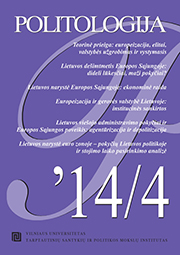TEORINĖ PRIEIGA: EUROPEIZACIJA, ELITAI, VALSTYBĖS UŽGROBIMAS IR VYSTYMASIS
THEORETICAL APPROACH: EUROPEANIZATION, ELITES, STATE CAPTURE AND DEVELOPMENT
Author(s): Klaudijus ManiokasSubject(s): Social Sciences
Published by: Vilniaus universiteto leidykla & VU Tarptautinių santykių ir politikos mokslų institutas
Summary/Abstract: The aim of the paper is to present conceptual framework used to assess Europeanization in Lithuania during the last 10 years across the classical to Europeanization literature dimensions of polity, politics and policy. In the article author reviews Europeanization literature, the main approaches as well as their critique and weak points. Author argues that because usually consequences of Europeanization are fragmented and hardly possible to generalize, therefore, it is wise to look at the new EU member states, where this impact was concentrated. The latest Europeanization literature, however, mostly critically views the very concept of Europeanization, especially because of its inability to include factors of domestic politics. Transitology approach also has certain drawbacks which cannot explain changes in the new EU members. Thus, it is argued by the author that Europeanization theory has to be complemented by additional approaches accounting for a domestic change. Therefore, Europeanization is put into a broader development studies. The theory of development produced by Douglass C. North, John Joseph Wallis and Barry R. Weingast serves as theoretical framework in the research. This theory is about a long-term change based on de-patrimonialization of a given society and move from the so-called natural state characterized by the use of rents into an open access regime characterized by universal rights, competition, wide use of public goods and density of organizations. This developmental approach puts an emphasis on the role of elites, state capture and broader transformation of the society and thus focuses and complements the current theory of Europeanization. It also provides a framework to analyse the issue of corruption and state capture, which is no longer considered as a deviation, but rather as a norm.
Journal: Politologija
- Issue Year: 2014
- Issue No: 4 (76)
- Page Range: 3-39
- Page Count: 37
- Language: Lithuanian

